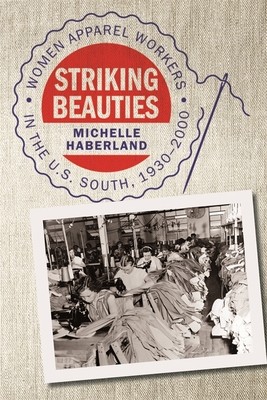
- We will send in 10–14 business days.
- Author: Michelle Haberland
- Publisher: University of Georgia Press
- ISBN-10: 0820347426
- ISBN-13: 9780820347424
- Format: 17.7 x 22.4 x 1.5 cm, softcover
- Language: English
- SAVE -10% with code: EXTRA
Reviews
Description
Apparel manufacturing in the American South, by virtue of its size, its reliance upon female labor, and its broad geographic scope, is an important but often overlooked industry that connects the disparate concerns of women's history, southern cultural history, and labor history. In Striking Beauties, Michelle Haberland examines its essential features and the varied experiences of its workers during the industry's great expansion from the late 1930s through the demise of its southern branch at the end of the twentieth century.
The popular conception of the early twentieth-century South as largely agrarian informs many histories of industry and labor in the United States. But as Haberland demonstrates, the apparel industry became a key part of the southern economy after the Great Depression and a major driver of southern industrialization. The gender and racial composition of the workforce, the growth of trade unions, technology, and capital investment were all powerful forces in apparel's migration south. Yet those same forces also revealed the tensions caused by racial and gender inequities not only in the region but in the nation at large. Striking Beauties places the struggles of working women for racial and economic justice in the larger context of southern history. The role of women as the primary consumers of the family placed them in a critical position to influence the success or failure of boycotts, union label programs and ultimately solidarity.EXTRA 10 % discount with code: EXTRA
The promotion ends in 19d.16:26:29
The discount code is valid when purchasing from 10 €. Discounts do not stack.
- Author: Michelle Haberland
- Publisher: University of Georgia Press
- ISBN-10: 0820347426
- ISBN-13: 9780820347424
- Format: 17.7 x 22.4 x 1.5 cm, softcover
- Language: English English
Apparel manufacturing in the American South, by virtue of its size, its reliance upon female labor, and its broad geographic scope, is an important but often overlooked industry that connects the disparate concerns of women's history, southern cultural history, and labor history. In Striking Beauties, Michelle Haberland examines its essential features and the varied experiences of its workers during the industry's great expansion from the late 1930s through the demise of its southern branch at the end of the twentieth century.
The popular conception of the early twentieth-century South as largely agrarian informs many histories of industry and labor in the United States. But as Haberland demonstrates, the apparel industry became a key part of the southern economy after the Great Depression and a major driver of southern industrialization. The gender and racial composition of the workforce, the growth of trade unions, technology, and capital investment were all powerful forces in apparel's migration south. Yet those same forces also revealed the tensions caused by racial and gender inequities not only in the region but in the nation at large. Striking Beauties places the struggles of working women for racial and economic justice in the larger context of southern history. The role of women as the primary consumers of the family placed them in a critical position to influence the success or failure of boycotts, union label programs and ultimately solidarity.

Reviews